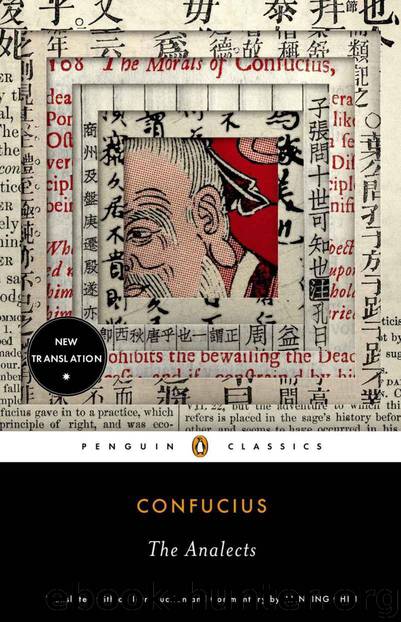The Analects (Penguin Classics) by Confucius

Author:Confucius
Language: eng
Format: azw3
Publisher: Penguin Publishing Group
Published: 2014-09-29T16:00:00+00:00
11.23 When Confucius found his life under threat in Kuang, Yan Hui fell behind. [Later, when they reunited,] Confucius said, “I thought you were dead.”
Yan Hui replied, “With you, Master, still alive, how would I dare to die?”
The crisis at Kuang, first mentioned in the Analects (9.5), received a lot of attention from historians and writers of the Warring States period and in the Han. They tried to explain why Confucius was surrounded by an angry mob when he entered the town of Kuang and how he managed to disband the crowd and save his own skin. But here we learn that Yan Hui was not with him when his life was “under threat.” This bit of information in the early records, together with the conversation that followed, became, again, fodder for speculation. Scholars ask: Just how did Yan Hui get left behind? Was it chance or did he deliberately stay out of sight? And why did he say that he would not “dare to die” while his teacher was still alive? In addressing these questions, they like to emphasize the love Yan Hui had for Confucius—like that of a filial son for his father, they say. And just as such a son would not act rashly while his father was alive, for fear that his death might leave his father all alone, Yan Hui, who unlike Zilu was cautious and “good at planning,” made himself scarce until it was safe to emerge. But how did he know that Confucius would survive the mob in Kuang? Han writers seem to think that Confucius’ integrity eventually would have become apparent to the people there and that when the people realized the man that he was they would have let him go. Such arguments are built on hindsight—they let Yan Hui off the hook too easily if his absence in Kuang was unintended.
Download
This site does not store any files on its server. We only index and link to content provided by other sites. Please contact the content providers to delete copyright contents if any and email us, we'll remove relevant links or contents immediately.
| Confucianism | Feng Shui |
| I Ching | Jainism |
| Karma | Shintoism |
| Sikhism | Tao Te Ching |
| Taoism | Tibetan Book of the Dead |
| Zoroastrianism |
The Tao of Physics by Fritjof Capra(2276)
Human Design by Chetan Parkyn(2072)
The Diamond Cutter by Geshe Michael Roach(2060)
Feng Shui by Stephen Skinner(1940)
The Alchemy of Sexual Energy by Mantak Chia(1860)
Tao Te Ching by Lao Tzu(1841)
365 Tao: Daily Meditations by Ming-Dao Deng(1621)
Tao Tantric Arts for Women by Minke de Vos(1599)
Sun Tzu's The Art of War by Giles Lionel Minford John Tzu Sun(1541)
Sidney Sheldon (1982) Master Of The Game by Sidney Sheldon(1520)
Buddhism 101 by Arnie Kozak(1512)
Karma-Yoga and Bhakti-Yoga by Swami Vivekananda(1495)
The Analects of Confucius by Burton Watson(1436)
The Art of War Other Classics of Eastern Philosophy by Sun Tzu Lao-Tzu Confucius Mencius(1428)
Tao te ching by Lao Tzu(1366)
The Way of Chuang Tzu by Thomas Merton(1364)
The New Bohemians Handbook by Justina Blakeney(1355)
The Sayings Of by Confucius(1316)
Bless This House by Donna Henes(1271)
